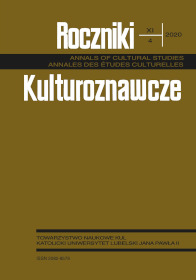Mit „ciemnego” średniowiecza we współczesnym dyskursie społecznym
The Myth of the “Dark” Middle Ages in the Contemporary Social Discourse
Author(s): Wanda Bajor, Małgorzata GruchołaSubject(s): History, Anthropology, Social Sciences, Middle Ages, Culture and social structure , 6th to 12th Centuries
Published by: Towarzystwo Naukowe KUL & Katolicki Uniwersytet Lubelski Jana Pawła II
Keywords: myth; “dark” Middle Ages; culture; value; reason; freedom; cultural crisis; quantitative and qualitative analysis; questionnaire research survey; diagnostic survey
Summary/Abstract: In our reflection on Europe’s cultural identity, we will refer to its three sources: Greek philosophy, Roman law, and Christianity. The third source, Christianity, is considered to be the heart of medieval culture, which created Europe based on evangelical values such as truth, love, compassion, humility, equality, fraternity, freedom, and human dignity. Nevertheless, the medieval era is still being depreciated and ignored like no other. The myth of the “dark” Middle Ages, promoted in the Renaissance, passed on and deepened in subsequent eras, became permanent and has a lasting place in the common consciousness. Medievalists ask: “why is this happening?” In popular discourse, we constantly hear the epithet about the “dark” Middle Ages. The presented research aims to determine the state of knowledge about medieval culture as well as contemporary people’s perceptions of that era. The results of surveys aimed at examining the presence of the myth about the “dark” Middle Ages in the awareness of contemporary society may be a contribution to further research on this phenomenon. The importance of this problem lies in the fact that it reflects contemporary man’s relationship to the values represented by medieval culture.
Journal: Roczniki Kulturoznawcze
- Issue Year: 11/2020
- Issue No: 4
- Page Range: 71-116
- Page Count: 46
- Language: Polish

